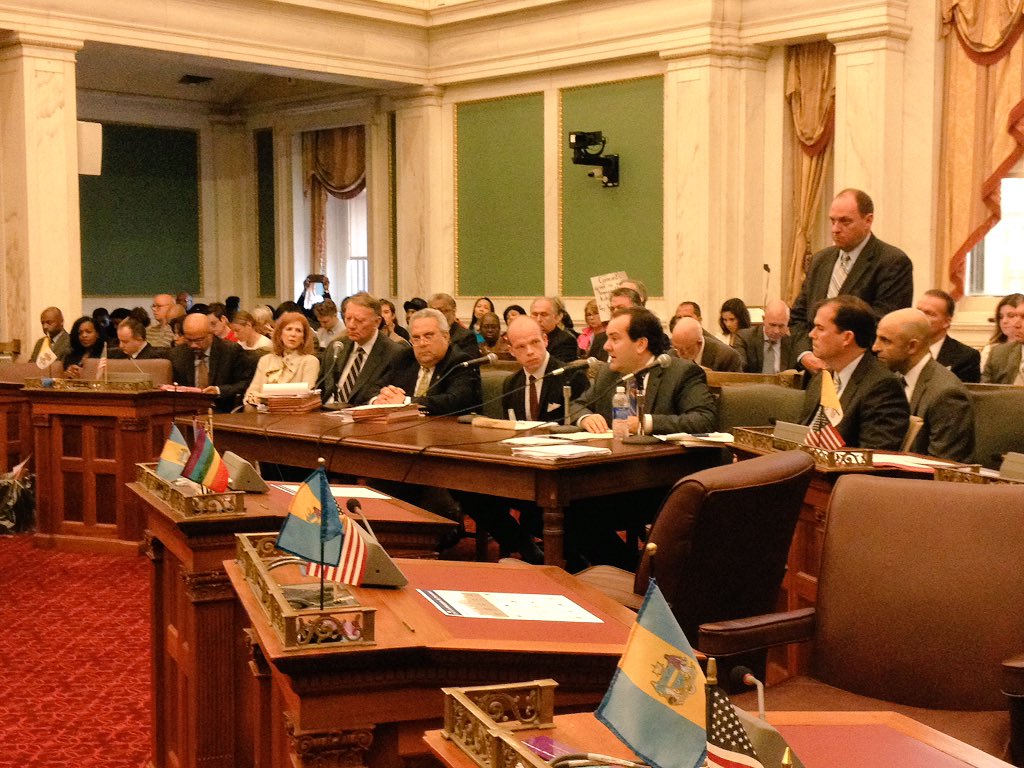Adel Ebeid was having a long day.
As the city’s lead negotiator for the Comcast franchise renewal talks, the city’s Chief Innovation Officer had the unglamorous job of fielding questions from City Council about the proposed Comcast contract for hours today. He sat front and center before City Council Thursday afternoon as darkness fell and the hearing wound into evening.
It was a big, historic day at City Council. That was the setup, at least. They were hosting a hearing about the Comcast franchise agreement, which is only renewed every 15 years. Comcast and the city have been at the negotiating table for the last six months, but the city has been conducting research for longer, hiring an outside firm — CBG Communications — to conduct a consumer survey. The city had also held six public forums, some of which local technologists organized around and attended en masse.
But Council has the final say on the contract, and Councilman Bobby Henon, who was running the hearing, was taking the exercise seriously.
Read our explainer on the franchise talks
After an open call for speakers, Henon’s office organized a slate of “witnesses,” including business leaders like Rob Wonderling of the Greater Philadelphia Chamber of Commerce and Bill Hankowsky, whose Liberty Property Trust is developing the second Comcast tower, community media producers like Gretjen Clausing of PhillyCAM and Louis Massiah of West Philadelphia’s Scribe Video Center, and educators like Hillary Linardopoulos with the Philadelphia Federation of Teachers. Each of them took the mic for a few minutes — many went over the allotted three minutes, many had to be reminded to speak into the mic — and then returned to their seats.
But Ebeid and CBG Communications president Tom Robinson were the only ones who stayed at the mics for most of the hearing. At one point, Councilman Wilson Goode Jr. fired away at Ebeid, repeatedly asking him why Council didn’t have the full proposed contract document and cutting him off every time Ebeid tried to answer.
“Why don’t I have a copy of what you have?” he said. “Because it’s none of my business yet, right?”
“Not at all,” Ebeid said. The document wasn’t ready yet, he said.
FYI, the proposed contract includes a $500,000 “Digital Inclusion Alliance Fund,” the launch of a call center that will hire 150 to 200 Philadelphians and an expansion of Comcast’s low-cost Internet Essentials program.
Speaking to us later, Henon didn’t seem to think it was a huge deal since Council had a list of terms outlined in the contract, though he said he was hopeful that Ebeid’s office would finish the contract and share it with Council before Council voted on the issue.
Oftentimes, it felt like a show. Complete with applause from the crowd — mostly the grassroots groups asking Comcast to do more — in support of certain speakers. But was the hearing really going to make a difference?
Each side played their part.
Comcast’s VP of Government Affairs, Kathleen Sullivan, and others like Econsult’s Steve Mullin, repeated the stats on Comcast’s undeniably large impact on the Philadelphia economy:
- More than 8,000 employees, or six percent of the company’s 139,000 person workforce, in Philadelphia;
- $42 million paid out to the School District in property taxes, which will shoot up to more than $269 million between 2015 and 2029 when Comcast’s property tax abatement expires;
- and $21.5 million in expected city tax revenue from the new Comcast tower alone.
https://twitter.com/TechnicallyPHL/status/664869297089589248
Hankowsky, of Liberty Property Trust, spoke about how lucky Philadelphia was to have Comcast, “a company that could locate anywhere.”
“When [Comcast] acquired AT&T [Broadband], the mayor of Denver flew to this city and offered [Comcast] a package to go there. They didn’t take it,” Hankowsky said.
He added: “This company has made commitment after commitment to this city.”
On the other hand, advocates spoke of the necessity to expand Internet Essentials, Comcast’s low-cost internet option, which has been criticized for not going far enough. Only families who have children who are eligible for free or reduced lunch can get the service, though in the proposed contract, Comcast would expand the service to senior citizens. Hannah Sassaman of the Media Mobilizing Project asked that the service be expanded to reach those qualifying for food stamps, Medicaid and housing assistance.
Rev. Gregory Holston gave an especially stirring plea to Comcast, saying: “We come not to ask for charity but to ask for justice.” Applause. “Charity is always controlled by the powerful to dispense as they please.”
Addressing Comcast, he said, “You have the ability to make the difference and give us the justice we need.”
Councilwoman Maria Quinones-Sanchez, who had co-authored an editorial in the Inquirer today with Councilwoman-elect Helen Gym about how Comcast could close the digital divide, asked questions focused on internet access and building a STEM pipeline.
But would any of it make a difference? How much would the proposed contract change after the hearing? And how much of the actual conversation was going on behind closed doors? (Comcast spent $111,000 on lobbying the city during the franchise talks. Media Mobilizing Project spent $29,000.)
It’s still unclear. Council would not vote on the bill tonight, Henon told us. He’d hold another public hearing on Dec. 1, and tonight’s evening public comment session, with more than 75 people signed up to speak, is still ongoing as this story goes to press.
But, as the first half of the hearing ended, Henon thanked Ebeid for his work and dismissed him.







